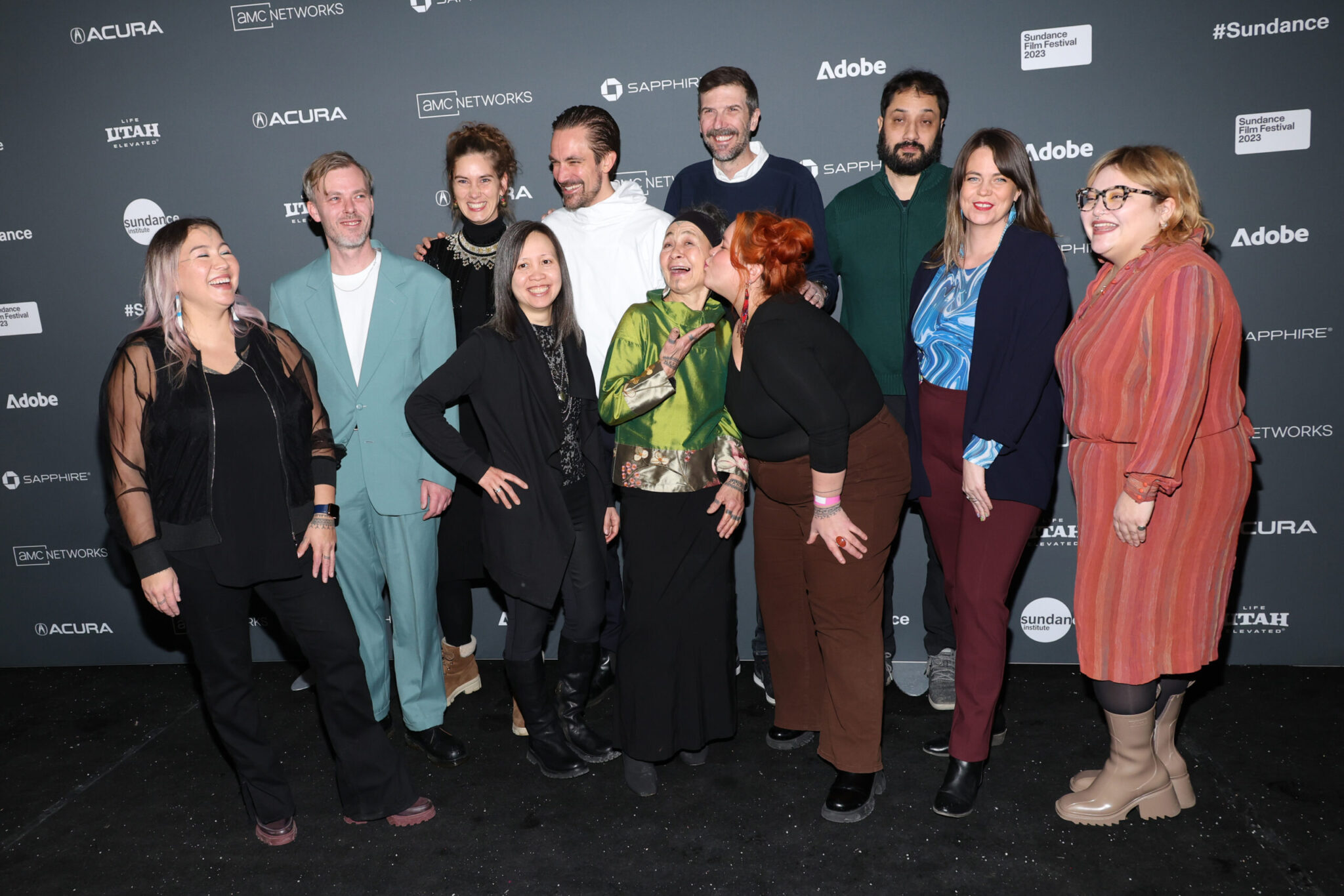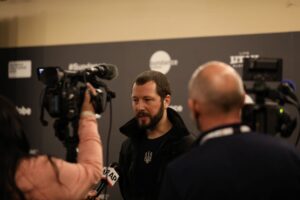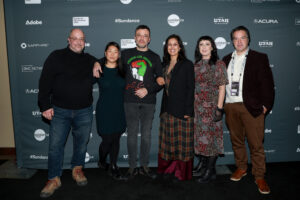PARK CITY, UTAH – JANUARY 23: (L–R) Alethea Arnaquq-Baril, Mark Bukdahl, Lin Alluna, Iris Ng, Emile Hertling Péronard, Aaju Peter, Bob Moore, Stacey Aglok MacDonald, Mila Aung-Thwin, Katie McKay, and Vee di Gregorio attend the 2023 Sundance Film Festival “Twice Colonized” premiere at Library Center Theatre on January 23, 2023 in Park City, Utah. (Photo by Monica Schipper/Getty Images)
By Lucy Spicer
In a memorable scene near the beginning of director Lin Alluna’s documentary, Aaju Peter crouches in front of her laptop, which is set up on a small table in her hotel room. She selects a video of a live performance of Tina Turner’s “Proud Mary.” And then she starts dancing. This woman exudes pure joy as she enthusiastically moves to the music — at some point even climbing on top of the bed to do so. This isn’t the only time we see her dancing, either.
The moments of happiness in Twice Colonized — which premiered at the Library Center Theatre on January 23 — are a true testament to the strength of character of its subject. Aaju Peter is a Greenlandic Inuit activist and lawyer who has spent years fighting for the rights of Indigenous peoples in the Arctic. In archival footage, Aaju speaks at podiums, looking almost regal as she explains how seal-hunting bans have devastated the economy for Inuit communities.
But behind this strength is a profound pain, and colonization is at the root. Today, Greenland remains part of the Kingdom of Denmark, and the effects of colonization are far-reaching. As a young girl, Aaju was sent to school in Denmark until she turned 18. When she returned, she could no longer speak her language and felt like an outsider in her own community.
“I knew that I wanted to make a film that was both personal and poetic and political, and what drew me to Aaju in the beginning was that she would tell me, ‘You can’t just film the success of me on the stage and in the spotlight. You have to film the battle behind the scenes of me dealing with the effects of colonization,’” says Alluna at the film’s post-premiere Q&A.
The documentary does, indeed, get deeply personal. In the film, we witness Aaju trying to grapple with the recent death of her son. She also goes through repeated attempts to fully break from an abusive relationship.
What’s amazing is how she manages to channel her pain into trying to make the world a better place. “There’s a lot of work to be done at this stage. There needs to be better understanding of what colonization and residential schooling and loss of language has done to our people,” explains Aaju. “And we also, ourselves, need to do a lot of work of healing, of taking back our traditions, our language, and our practices. But it’s also on the people who tried to take our language, on the people that caused so much harm, to look at what was done and acknowledge it. And we can work together for a better future.”
The film’s second act follows Aaju as she speaks with various Indigenous peoples around Europe, listening to their accounts of how colonization continues to stifle them today. Her goal becomes clear: There should be an Indigenous forum at the European Union so that Indigenous peoples can have permanent representation in discussions surrounding issues that affect them.
Throughout these efforts, Aaju is always cognizant of her own journey. “I was thinking to write a book,” she says in the film. “I was born in Greenland and colonized by the Danes. Then I moved to the Canadian Arctic and was colonized by southern Canada. So our history has been written by outsiders and visitors. I want to write our own history. I wanted to title it Twice Colonized.”
Having a hand in telling her own story is crucial and is also the reason Aaju has a screenwriting credit on the film. “I’m glad that I was able to take part in what I would like included and what scenes I thought to be saved for the sequel,” she says to a laughing and cheering audience at the post-premiere discussion. “… Twice Decolonized.”










